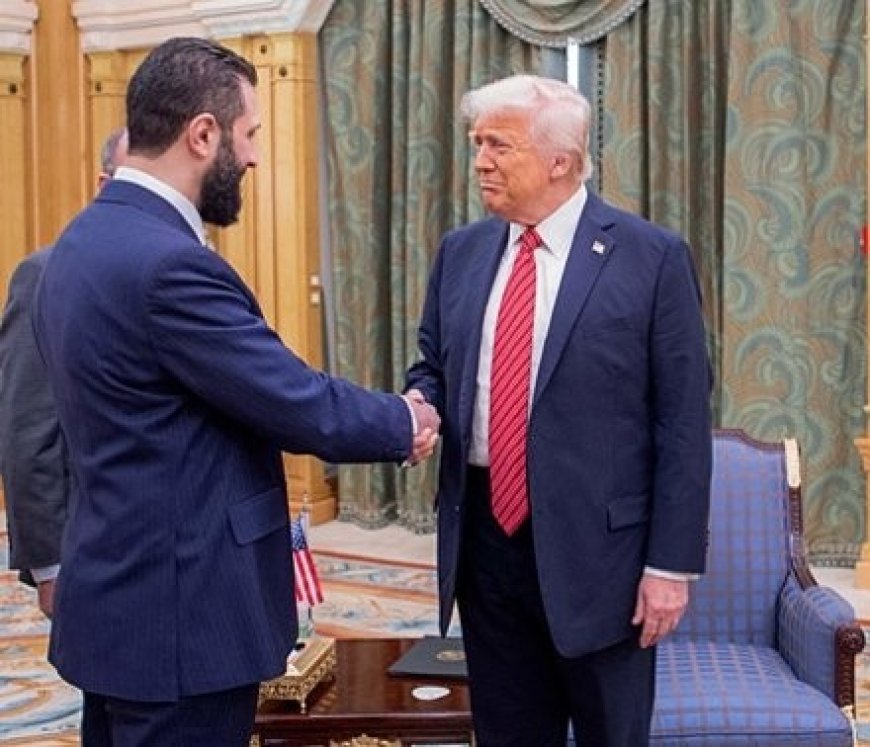Embracing Al-Julani: How America’s Double Standards on Terrorism Stand Exposed
In 2013, the U.S. designated Jabhat al-Nusra as a Foreign Terrorist Organization, with al-Julani listed as a wanted terrorist.

For decades, the United States has waged wars across the globe in the name of combating terrorism—killing millions, displacing countless others, and spending billions of dollars. But when Washington extends a warm embrace to one of the most notorious extremist leaders, Abu Mohammad al-Julani, questions naturally arise: Is the U.S. truly fighting terrorism, or merely manipulating it to serve its geopolitical interests?
Who is Abu Mohammad al-Julani?
Born as Ahmad Hussein al-Shara, al-Julani rose through the ranks of al-Qaeda during the Iraq war and later founded Syria's brutal jihadist group Jabhat al-Nusra, responsible for thousands of civilian deaths, massacres of minorities, and gruesome acts like suicide bombings and beheadings. In 2013, the U.S. designated Jabhat al-Nusra as a Foreign Terrorist Organization, with al-Julani listed as a wanted terrorist.
A Sudden Shift in the U.S. Narrative
In a shocking shift, a 2021 PBS interview showcased al-Julani dressed in a Western suit, speaking about democracy and stability. Western think tanks and media began portraying him as a “moderate local leader” and a “stabilizing force” in Idlib, Syria—despite his violent past. The same U.S. government that once targeted him with drone strikes now sees him as a potential ally.
This shift is driven by strategic interest: the U.S. seeks to counterbalance Assad's regime and Iran-Russia influence in Syria. Since al-Julani controls significant territory in Idlib, Washington appears willing to forge a temporary alliance. The logic: “The enemy of my enemy is my friend.”
Terrorism as a Tool, Not a Principle
This isn’t new. The U.S. has previously supported radical groups in Afghanistan, Pakistan, and Libya for its strategic gains. When militants align with U.S. interests, they are rebranded as “freedom fighters.” But when they go rogue, they are condemned as terrorists. This cynical approach raises serious questions about the moral foundations of the so-called “War on Terror.”
Muslim World’s Growing Disillusionment
America’s softening stance towards al-Julani has deeply disillusioned many in the Muslim world. It fuels the belief that Washington views terrorism not as a universal evil but as a flexible label—used to demonize enemies and sanitize allies. Is a beheading only terrorism when it threatens U.S. interests, but not when the perpetrator aligns with them?
By legitimizing al-Julani, the U.S. has undermined its own credibility and exposed the hollowness of its anti-terror rhetoric. For the victims of U.S. policies in Syria, Iraq, Yemen, and Palestine, this is yet another betrayal.
Hypocrisy Towards India and Pakistan
In a related diplomatic controversy, the U.S. recently praised the ceasefire agreement between India and Pakistan and called Pakistan a “partner in peace”—a statement issued just days after the Pahalgam terror attack in which innocent Indian civilians and soldiers lost their lives.
This statement has deeply hurt India, a nation that has long suffered from Pakistan-sponsored cross-border terrorism. Calling Pakistan—a known haven for terror groups—a “peace partner” while India mourns its dead, is seen by many as a cruel insult and a mockery of victims' pain.
For a country that vowed to lead the global fight against terrorism post-9/11, such praise for a state linked to multiple attacks on Indian soil—including Mumbai, Pulwama, and now Pahalgam—is nothing short of diplomatic hypocrisy.
The World Must Wake Up
India, a peace-loving democracy, continues to fight terror with resilience and strength. But global powers like the U.S. must be held accountable for supporting terror-linked figures and states under the guise of strategic necessity. The Pahalgam attack was not just an act of terror; it was an assault on the soul of India.
As the line between terrorist and political ally continues to blur in Washington’s playbook, it is now up to the global community to recognize and challenge the dangerous fusion of counterterrorism and realpolitik.













































